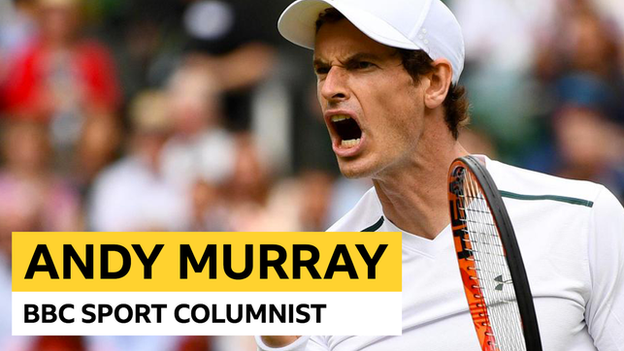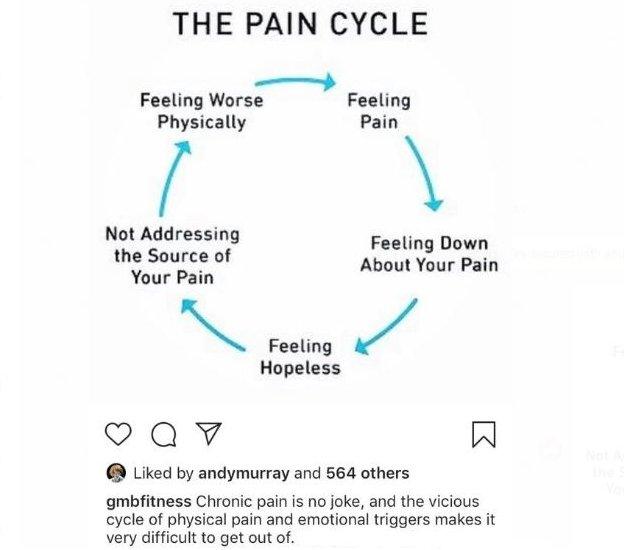Andy Murray column: Meeting Royal surgeon was pivotal in helping me play again at Queen's
- Published

Andy Murray is set to make his competitive return on Thursday in the doubles at Queen's. In his regular BBC Sport column, the 32-year-old Scot talks about meeting the woman who performed his "life-changing" hip surgery and how operating on the Queen Mother didn't necessarily mean she was right for him.
Five months ago, sitting in a news conference at the Australian Open, I thought I was seemingly on the verge of retiring from the sport that I love.
It was uncomfortable playing with my children at the soft play centre. I couldn't sleep properly. I couldn't do basic everyday tasks like putting on my shoes and socks. I was in pain all the time.
Now I'm getting ready to step back on to the court competitively in the doubles at Queen's.
I didn't expect to be in this position, I didn't know how it would feel if I had the hip resurfacing operation.
Even if I'd never tried to play tennis again, I would have had the operation because I couldn't walk properly.
A pivotal moment in my return has been meeting Sarah Muirhead-Allwood, the surgeon at the London Hip Unit who operated on me in January.
I knew she had operated on the Queen Mother's hip in the past and other well-known people from outside of sport - but I didn't know how that would translate to working on an athlete.
I first met Sarah in late January, shortly after I got back to London from Melbourne, and we chatted for about an hour. During this I asked her: "How do I know you're good?"
I wasn't doing it to be rude, but in sport you can tell how good someone is by their ranking. But how do I know a surgeon is good?
She just said to me: "Well, you don't. You don't know."
I felt she was very honest with me and I admired that. She didn't promise I would get back to playing. She told me exactly what to expect and what my expectations should be.
If she didn't know something then she would say she didn't know the answer rather than trying to sell me something that might not be case. That was why I had surgery with her.
I didn't want to have someone telling me "you'll definitely be back and winning Wimbledon in five months", because it doesn't work like that and it wouldn't have been true.
I wasn't promised that. The reason for having the operation was not to come back and play tennis. The reason was to improve my quality of life and the operation has been life-changing.
'I don't believe in fate - but some odd things happened'
A few very strange things happened on the day I met Sarah for our first chat.
I went to have a scan after our meeting and the guy who operated on my back in 2013 messaged me out of the blue, asking how I was getting on with my hip.
I told him I was actually having a scan at the Lister Hospital in Chelsea - and it turned out he was in the room next door seeing patients.
So he came to see me and we chatted about Sarah. He said she had a fantastic reputation and that she was very good.
I also bumped into the guy who has read all of my scans over my whole career when I walked out of the lift.
He asked what I was doing there and I told him I'd just met Sarah. He also said only very positive things.
After speaking to Sarah for about an hour, and then hearing what these people in the medical industry said, I knew in my head I wanted her to operate on me.
I don't necessarily believe in fate but it was really odd.
I went home and chatted it through with my wife Kim and my team. Then a few days later I had the operation.
Andy Murray speaking about his 'life-changing' operation
'It was harder to enjoy spending time with my children'
Long-term pain can be demoralising and it definitely affected my mental health, but at the time I didn't realise it as much because it became the norm.
Days just became trickier and I wasn't living life like I would want to. I'd finish practising and would just want to have my feet up all day because of the pain.
I was still able to play with my kids; it was just getting harder to enjoy the things we did together.
When we'd go to soft play places, it was so uncomfortable on my hands and knees crawling through tunnels. Now I'm the first one on the slides or taking part in mini gymnastics.

Murray recently liked this Instagram post which highlights the mental struggles for people suffering from chronic pain
I'm doing all the things I used to really enjoy doing and which I wouldn't have been doing six months ago - playing golf, taking part in 'escape rooms', spending more time with friends. Added to that, I'm back on the court and enjoying playing and all the physical training.
Escape rooms are definitely something worth trying if you haven't yet. You get locked in a room with your friends and try to escape within your allotted time. It is all about the strategy and it gets competitive, which I love.
I also played golf with my brother in the club championship at Wentworth on Saturday. It's an amazing course, but it didn't go well - and I started with several shanked shots on the first hole. We both shot triple digits and I play off a handicap of six! It was windy though...
Before the operation I'd have never played golf the day before a tournament because my hip would hurt, whereas now I can do things like that and be pain free.
Andy Murray was talking to BBC Sport's Jonathan Jurejko.